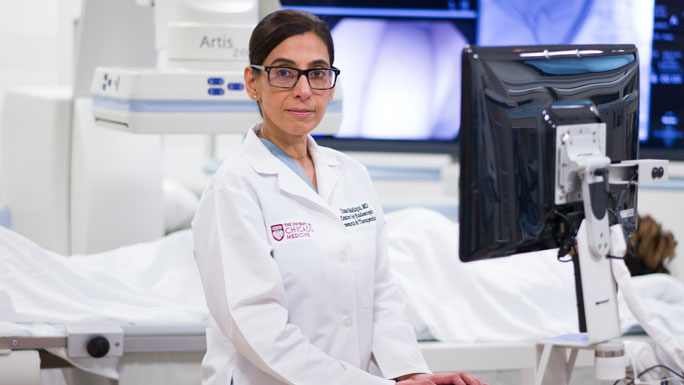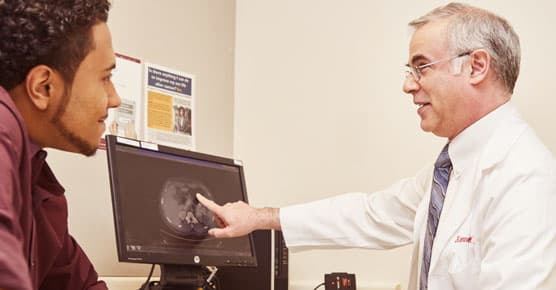Pancreatic Cancer Diagnosis

No single test can determine whether someone has pancreatic cancer. Some signs and symptoms of the disease, such as abdominal pain and unexplained weight loss, are often nonspecific or vague. Jaundice (a yellowing of the skin or whites of the eyes) is a more typical complaint because when pancreatic cancer is located in the head of the pancreas, the tumor can block the common bile duct.
These symptoms are often associated with less serious problems, but always warrant further evaluation that may include a medical exam, radiographic studies and/or endoscopic procedures.
Advanced imaging technology and endoscopic procedures have revolutionized the detection, diagnosis and staging of pancreatic cancer. All of these noninvasive and minimally invasive techniques are available at the University of Chicago Medicine, enabling our specialists to detect, diagnose and stage pancreatic cancer without performing surgery:
- Computed Tomography (CT): Computed tomography offers physicians an accurate method of diagnosing and staging pancreatic cancer, or determining if and how far the cancer has spread. High definition CT scanners produce sharp, detailed images of the body and are extremely accurate.
- Magnetic Resonance Imaging (MRI) & Magnetic Resonance Cholangiopancreatography (MRCP): Standard MRI scans are beneficial for staging pancreatic cancer for some patients. Magnetic resonance MRCP, a type of MRI, is another tool used for staging. MRCP uses magnetic fields and radio waves to produce detailed images of the pancreatic ducts, a common site for pancreatic cysts that can develop into cancer.
- Endoscopic Ultrasound (EUS): This procedure is performed by an interventional gastroenterologist who passes a special endoscope through the mouth and into the stomach and small intestine The EUS scope uses sound waves to see the adjacent pancreas and can detect pancreatic tumors (even those too small to be seen on CT or MRI). EUS is important for evaluating pancreatic masses or cysts, and allows for real-time sampling of these lesions with fine needle aspiration. In the case of pancreatic cancer, an onsite pathologist interprets the samples during the EUS procedure, and in most cases, can provide an immediate diagnosis.
- Endoscopic Retrograde Cholangiopancreatography (ERCP): ERCP is another type of endoscopic procedure, which uses an endoscope and X-rays to help physicians visualize the bile duct and the pancreatic duct. There may be blockages caused by tumors or gallstones. A small piece of tissue may be taken for biopsy if cancer is suspected. ERCP can also be used to insert a stent in order to relieve any blockage in the bile ducts.
UChicago Medicine was one of the first medical centers in the nation to establish a program in interventional endoscopy.
Early Detection for High-Risk Patients
Individuals and families who are at risk for developing pancreatic cancer can now take advantage of sophisticated screening services. Doctors can then closely monitor patients, identifying early signs of cancer and treating it sooner.
Staging Pancreatic Cancer
Our pancreatic cancer team includes some of the nation’s most respected pathologists — highly skilled experts at examining tissue to accurately diagnose pancreatic cancer.
The results of diagnostic tests for pancreatic cancer determine clinical staging, which is the extent and severity of the disease. The American Joint Committee on Cancer (AJCC) established the TNM system, which uses three key factors to determine the stage of pancreatic cancer:
1. T: Size and location of tumor
2. N: Has it spread to nearby lymph nodes and, if so, how many
3. M: Has it metastasized (spread) to other sites in the body, such as distant lymph nodes or other organs
After a T, N or M category is determined, a stage grouping (0, I, II, III or IV) and a tumor grade (1, 2 or 3) are assigned.
Staging and other data from imaging and tissue analysis allow our medical, radiation and surgical oncologists to determine the best course of treatment: surgery, chemotherapy, radiation or a combination of therapies.

Cancer Care Second Opinions
Request a second opinion from UChicago Medicine experts in cancer care.

Participate in a Clinical Trial
UChicago Medicine pancreatic cancer experts are actively conducting clinical trials of new and promising treatments.

Cancer Pain Management
We offer a variety of treatments to effectively manage cancer pain.
